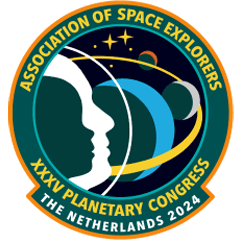Presentations regarding the Dutch Space Sector
1.30 pm – 2.00 PM: Philippe Schoonejans (ESA)
European Robotic Arm for ISS (ERA) – a story of perseverance
Built by Airbus NL, the ERA is the largest Dutch space project to date and one of, if not the longest running ESA project ever. Started in the eighties and nineties, numerous setbacks had to be overcome. What knowledge has ERA provided Europe with its precious experience on space robots and how to operate them?
2.00 pm – 2.30 PM: Rob van Hassel (Airbus)
Solar Panels on Orion
Airbus Netherlands BV designed and built the solar arrays for the first Orion spacecraft. The heavy launcher, the trans-lunar/earth injections, the moon eclipse, and last but not least the human aspect: they impose extraordinary requirements on the solar panels. How to overcome these challenges?
2.30 pm – 3.00 PM: Chris Verhoeven (TU Delft)
Lunar Zebro: Rovers
The Lunar Zebro project aims to build simple, autonomous swarm robots to establish a reliable, self-deploying and self-repairing infrastructure for navigation and communication on the surface and in caves and lava tunnels on the
moon and Mars. Will this infrastructure be vital for enhancing the safety and effectiveness of astronauts and larger rovers and for conducting large-scale scientific missions?
3.00 – 3.30 PM Coffee break
3.30 pm – 4.00 PM: Dimitra Stefoudi (Universiteit Leiden)
Space Law: legal aspects of lunar exploration and exploitation
What are the legal aspects of lunar exploration and exploitation? What do the current international treaties and regulations stipulate, and what challenges are there? And which governments and private entities are increasingly interested in the use of lunar materials?
4.00 pm – 4.30 PM: Layla van Ellen (TU Delft)
Extreme Architecture: building on Mars
Space Architecture is the field that deals will the challenges of building in extreme environments on Earth and in space. What are the challenges of building for the extreme and remote environment of the planet Mars? Will combined use of in situ resources and novel biotechnologies be vital to build habitats on Mars?
4.30 pm – 5.00 PM: Wieger Wamelink (WUR)
Space Farming: growing food on Mars
What are the developments related to growing food in space, and what have we discovered in recent years through experimental research? How are these techniques not only important for future missions in space but can also contribute to revitalizing depleted agricultural lands on Earth?
